Operational Delivery, Strategic Commissioning and NHS Performance
VerifiedAdded on 2021/01/02
|20
|5300
|67
Report
AI Summary
This report provides a comprehensive analysis of strategic commissioning and operational delivery within the National Health Service (NHS). It begins with an introduction to the key elements of strategic commissioning and operational delivery, emphasizing their role in driving cultural change and innovation within healthcare systems. The report then critically examines a commissioned service, specifically focusing on Smoking cessation services provided by the NHS. It details the commissioning cycle, assessing needs, managing risks, and determining priorities. The report also identifies key stakeholders, including patients, the government, and nurses, and explores the leadership skills essential for effective service delivery. Furthermore, the report investigates ways to improve organizational performance and outcomes, including the use of the care model and the challenges faced by the NHS, such as physician shortages and high pharmaceutical costs. The report concludes with a reflective log and development plan, summarizing key findings and outlining strategies for continuous improvement.
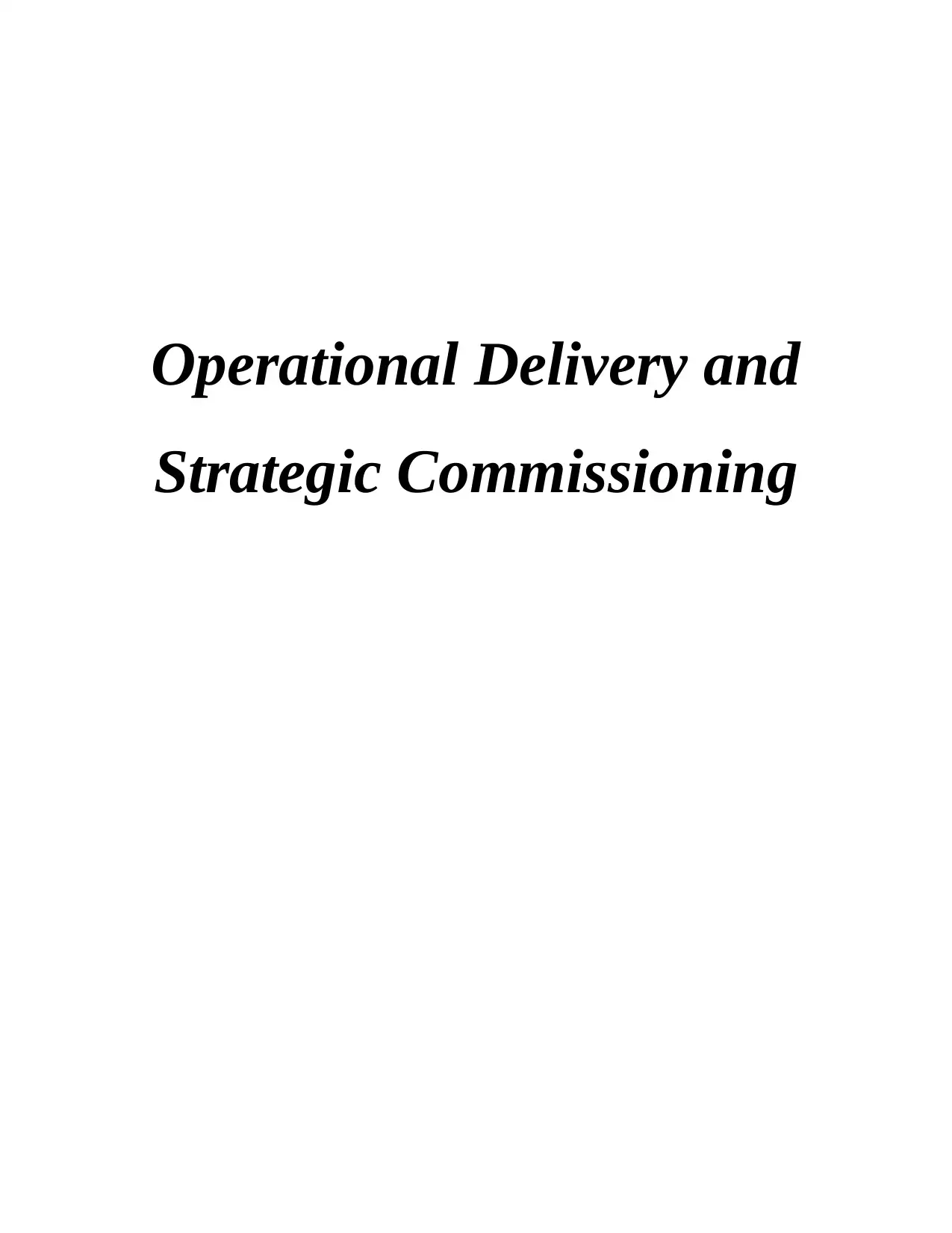
Operational Delivery and
Strategic Commissioning
Strategic Commissioning
Paraphrase This Document
Need a fresh take? Get an instant paraphrase of this document with our AI Paraphraser
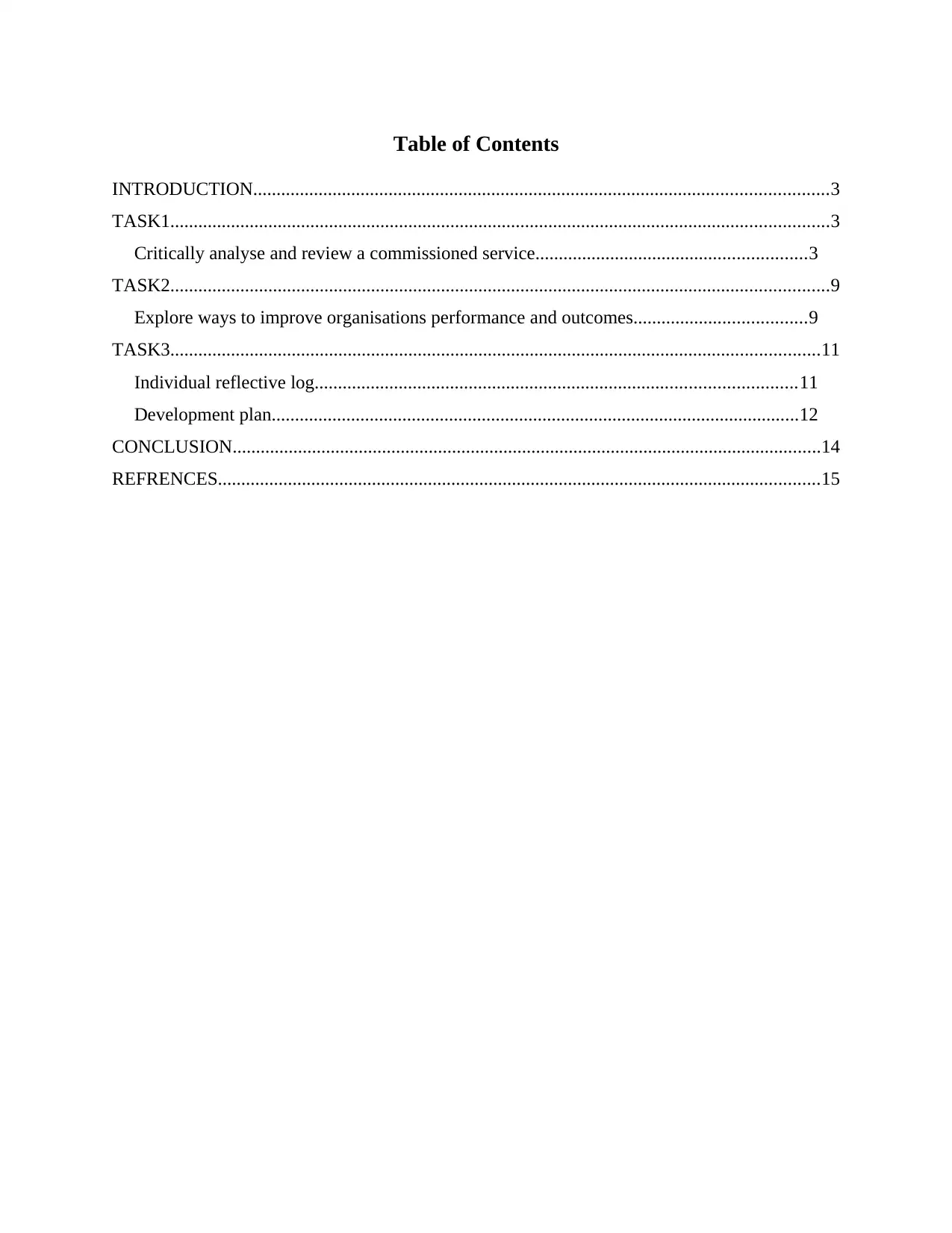
Table of Contents
INTRODUCTION...........................................................................................................................3
TASK1.............................................................................................................................................3
Critically analyse and review a commissioned service..........................................................3
TASK2.............................................................................................................................................9
Explore ways to improve organisations performance and outcomes.....................................9
TASK3...........................................................................................................................................11
Individual reflective log.......................................................................................................11
Development plan.................................................................................................................12
CONCLUSION..............................................................................................................................14
REFRENCES.................................................................................................................................15
INTRODUCTION...........................................................................................................................3
TASK1.............................................................................................................................................3
Critically analyse and review a commissioned service..........................................................3
TASK2.............................................................................................................................................9
Explore ways to improve organisations performance and outcomes.....................................9
TASK3...........................................................................................................................................11
Individual reflective log.......................................................................................................11
Development plan.................................................................................................................12
CONCLUSION..............................................................................................................................14
REFRENCES.................................................................................................................................15
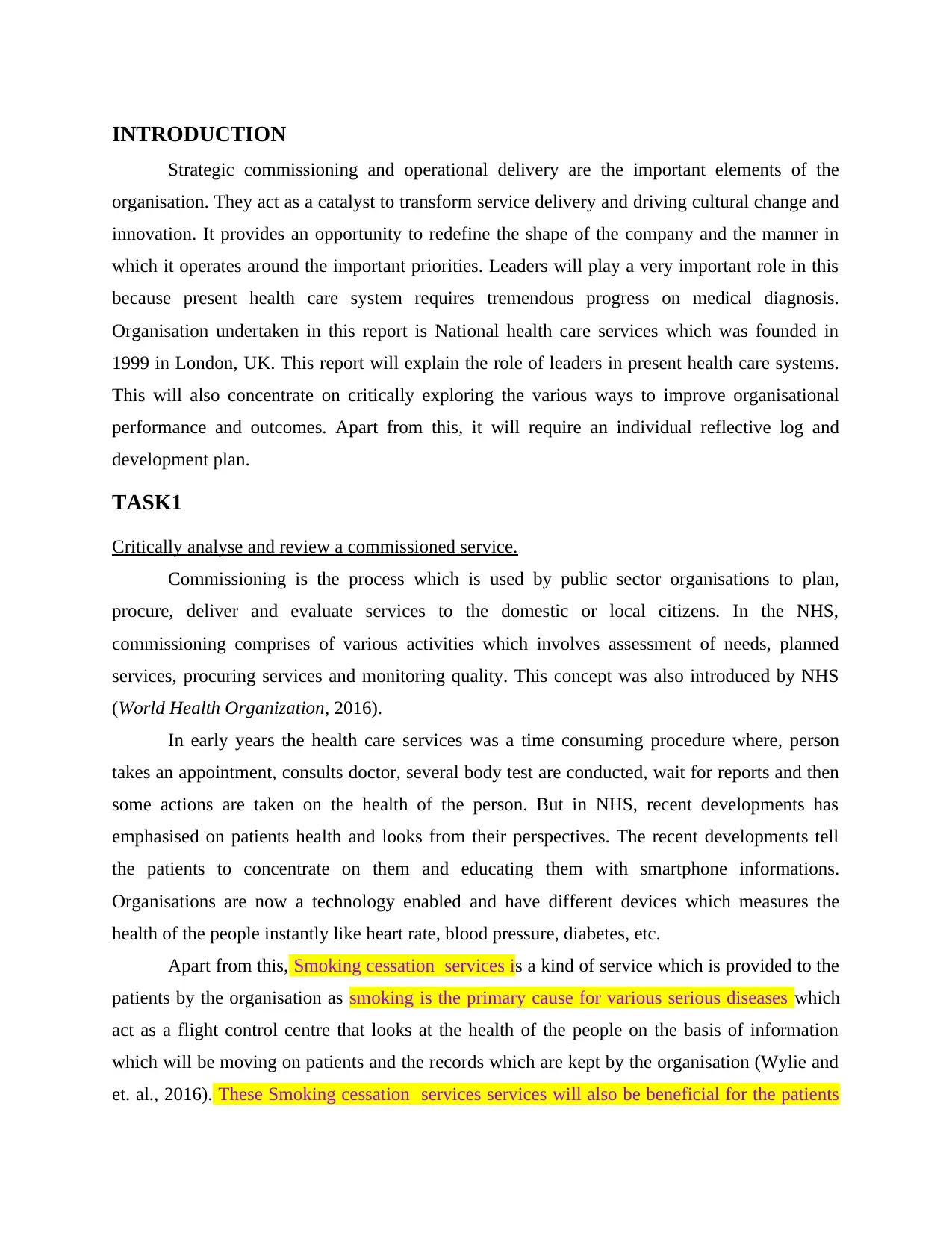
INTRODUCTION
Strategic commissioning and operational delivery are the important elements of the
organisation. They act as a catalyst to transform service delivery and driving cultural change and
innovation. It provides an opportunity to redefine the shape of the company and the manner in
which it operates around the important priorities. Leaders will play a very important role in this
because present health care system requires tremendous progress on medical diagnosis.
Organisation undertaken in this report is National health care services which was founded in
1999 in London, UK. This report will explain the role of leaders in present health care systems.
This will also concentrate on critically exploring the various ways to improve organisational
performance and outcomes. Apart from this, it will require an individual reflective log and
development plan.
TASK1
Critically analyse and review a commissioned service.
Commissioning is the process which is used by public sector organisations to plan,
procure, deliver and evaluate services to the domestic or local citizens. In the NHS,
commissioning comprises of various activities which involves assessment of needs, planned
services, procuring services and monitoring quality. This concept was also introduced by NHS
(World Health Organization, 2016).
In early years the health care services was a time consuming procedure where, person
takes an appointment, consults doctor, several body test are conducted, wait for reports and then
some actions are taken on the health of the person. But in NHS, recent developments has
emphasised on patients health and looks from their perspectives. The recent developments tell
the patients to concentrate on them and educating them with smartphone informations.
Organisations are now a technology enabled and have different devices which measures the
health of the people instantly like heart rate, blood pressure, diabetes, etc.
Apart from this, Smoking cessation services is a kind of service which is provided to the
patients by the organisation as smoking is the primary cause for various serious diseases which
act as a flight control centre that looks at the health of the people on the basis of information
which will be moving on patients and the records which are kept by the organisation (Wylie and
et. al., 2016). These Smoking cessation services services will also be beneficial for the patients
Strategic commissioning and operational delivery are the important elements of the
organisation. They act as a catalyst to transform service delivery and driving cultural change and
innovation. It provides an opportunity to redefine the shape of the company and the manner in
which it operates around the important priorities. Leaders will play a very important role in this
because present health care system requires tremendous progress on medical diagnosis.
Organisation undertaken in this report is National health care services which was founded in
1999 in London, UK. This report will explain the role of leaders in present health care systems.
This will also concentrate on critically exploring the various ways to improve organisational
performance and outcomes. Apart from this, it will require an individual reflective log and
development plan.
TASK1
Critically analyse and review a commissioned service.
Commissioning is the process which is used by public sector organisations to plan,
procure, deliver and evaluate services to the domestic or local citizens. In the NHS,
commissioning comprises of various activities which involves assessment of needs, planned
services, procuring services and monitoring quality. This concept was also introduced by NHS
(World Health Organization, 2016).
In early years the health care services was a time consuming procedure where, person
takes an appointment, consults doctor, several body test are conducted, wait for reports and then
some actions are taken on the health of the person. But in NHS, recent developments has
emphasised on patients health and looks from their perspectives. The recent developments tell
the patients to concentrate on them and educating them with smartphone informations.
Organisations are now a technology enabled and have different devices which measures the
health of the people instantly like heart rate, blood pressure, diabetes, etc.
Apart from this, Smoking cessation services is a kind of service which is provided to the
patients by the organisation as smoking is the primary cause for various serious diseases which
act as a flight control centre that looks at the health of the people on the basis of information
which will be moving on patients and the records which are kept by the organisation (Wylie and
et. al., 2016). These Smoking cessation services services will also be beneficial for the patients
⊘ This is a preview!⊘
Do you want full access?
Subscribe today to unlock all pages.

Trusted by 1+ million students worldwide
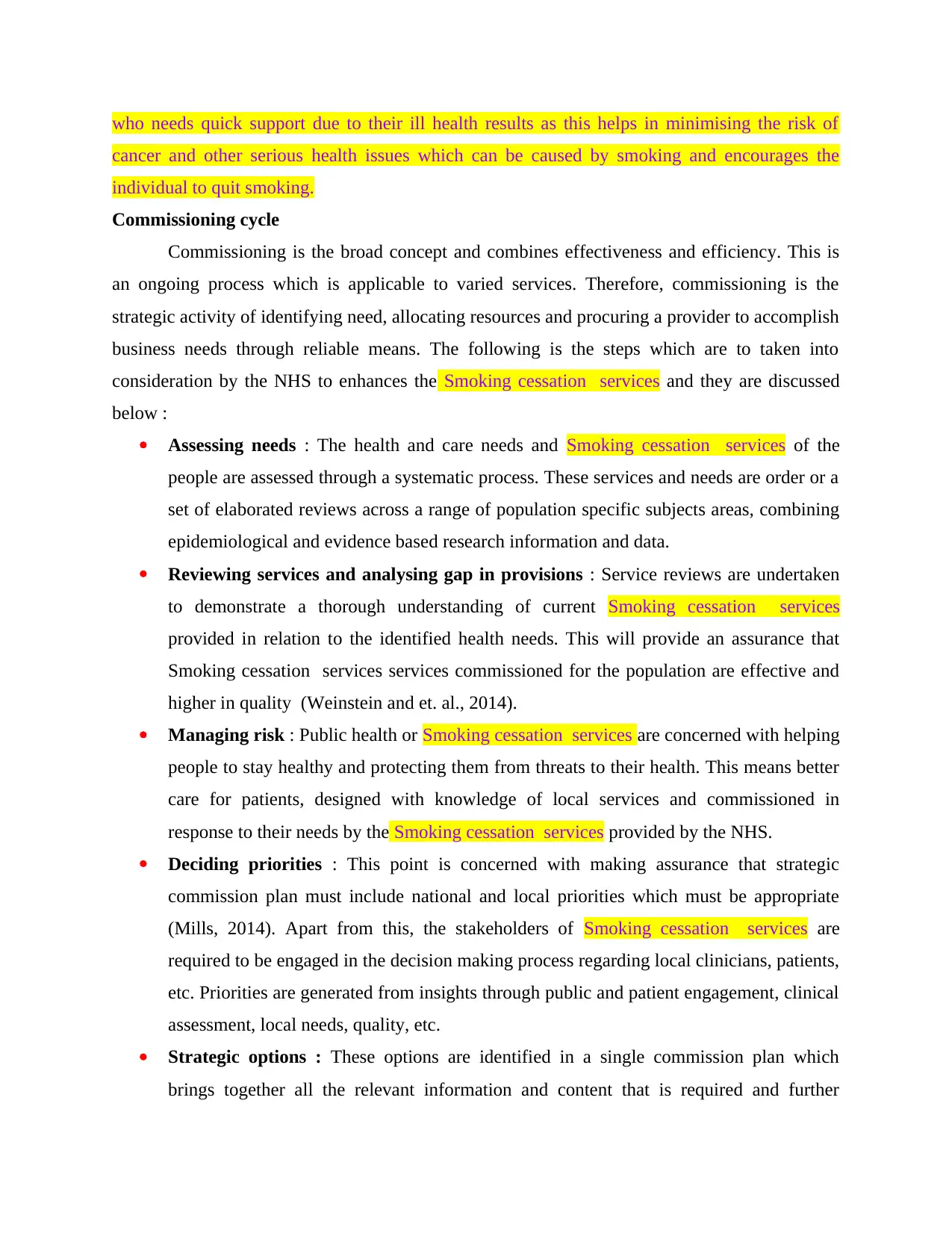
who needs quick support due to their ill health results as this helps in minimising the risk of
cancer and other serious health issues which can be caused by smoking and encourages the
individual to quit smoking.
Commissioning cycle
Commissioning is the broad concept and combines effectiveness and efficiency. This is
an ongoing process which is applicable to varied services. Therefore, commissioning is the
strategic activity of identifying need, allocating resources and procuring a provider to accomplish
business needs through reliable means. The following is the steps which are to taken into
consideration by the NHS to enhances the Smoking cessation services and they are discussed
below :
Assessing needs : The health and care needs and Smoking cessation services of the
people are assessed through a systematic process. These services and needs are order or a
set of elaborated reviews across a range of population specific subjects areas, combining
epidemiological and evidence based research information and data.
Reviewing services and analysing gap in provisions : Service reviews are undertaken
to demonstrate a thorough understanding of current Smoking cessation services
provided in relation to the identified health needs. This will provide an assurance that
Smoking cessation services services commissioned for the population are effective and
higher in quality (Weinstein and et. al., 2014).
Managing risk : Public health or Smoking cessation services are concerned with helping
people to stay healthy and protecting them from threats to their health. This means better
care for patients, designed with knowledge of local services and commissioned in
response to their needs by the Smoking cessation services provided by the NHS.
Deciding priorities : This point is concerned with making assurance that strategic
commission plan must include national and local priorities which must be appropriate
(Mills, 2014). Apart from this, the stakeholders of Smoking cessation services are
required to be engaged in the decision making process regarding local clinicians, patients,
etc. Priorities are generated from insights through public and patient engagement, clinical
assessment, local needs, quality, etc.
Strategic options : These options are identified in a single commission plan which
brings together all the relevant information and content that is required and further
cancer and other serious health issues which can be caused by smoking and encourages the
individual to quit smoking.
Commissioning cycle
Commissioning is the broad concept and combines effectiveness and efficiency. This is
an ongoing process which is applicable to varied services. Therefore, commissioning is the
strategic activity of identifying need, allocating resources and procuring a provider to accomplish
business needs through reliable means. The following is the steps which are to taken into
consideration by the NHS to enhances the Smoking cessation services and they are discussed
below :
Assessing needs : The health and care needs and Smoking cessation services of the
people are assessed through a systematic process. These services and needs are order or a
set of elaborated reviews across a range of population specific subjects areas, combining
epidemiological and evidence based research information and data.
Reviewing services and analysing gap in provisions : Service reviews are undertaken
to demonstrate a thorough understanding of current Smoking cessation services
provided in relation to the identified health needs. This will provide an assurance that
Smoking cessation services services commissioned for the population are effective and
higher in quality (Weinstein and et. al., 2014).
Managing risk : Public health or Smoking cessation services are concerned with helping
people to stay healthy and protecting them from threats to their health. This means better
care for patients, designed with knowledge of local services and commissioned in
response to their needs by the Smoking cessation services provided by the NHS.
Deciding priorities : This point is concerned with making assurance that strategic
commission plan must include national and local priorities which must be appropriate
(Mills, 2014). Apart from this, the stakeholders of Smoking cessation services are
required to be engaged in the decision making process regarding local clinicians, patients,
etc. Priorities are generated from insights through public and patient engagement, clinical
assessment, local needs, quality, etc.
Strategic options : These options are identified in a single commission plan which
brings together all the relevant information and content that is required and further
Paraphrase This Document
Need a fresh take? Get an instant paraphrase of this document with our AI Paraphraser
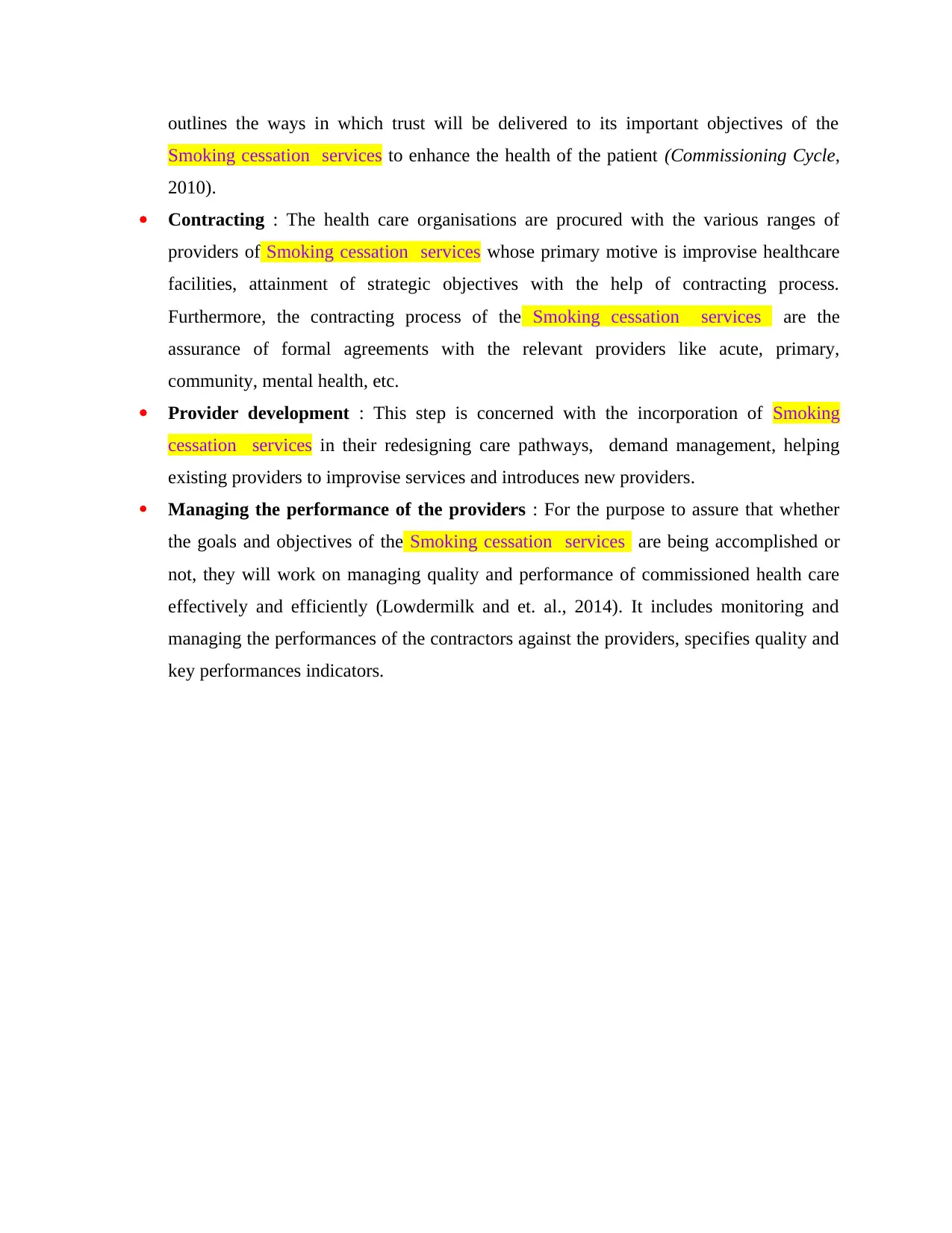
outlines the ways in which trust will be delivered to its important objectives of the
Smoking cessation services to enhance the health of the patient (Commissioning Cycle,
2010).
Contracting : The health care organisations are procured with the various ranges of
providers of Smoking cessation services whose primary motive is improvise healthcare
facilities, attainment of strategic objectives with the help of contracting process.
Furthermore, the contracting process of the Smoking cessation services are the
assurance of formal agreements with the relevant providers like acute, primary,
community, mental health, etc.
Provider development : This step is concerned with the incorporation of Smoking
cessation services in their redesigning care pathways, demand management, helping
existing providers to improvise services and introduces new providers.
Managing the performance of the providers : For the purpose to assure that whether
the goals and objectives of the Smoking cessation services are being accomplished or
not, they will work on managing quality and performance of commissioned health care
effectively and efficiently (Lowdermilk and et. al., 2014). It includes monitoring and
managing the performances of the contractors against the providers, specifies quality and
key performances indicators.
Smoking cessation services to enhance the health of the patient (Commissioning Cycle,
2010).
Contracting : The health care organisations are procured with the various ranges of
providers of Smoking cessation services whose primary motive is improvise healthcare
facilities, attainment of strategic objectives with the help of contracting process.
Furthermore, the contracting process of the Smoking cessation services are the
assurance of formal agreements with the relevant providers like acute, primary,
community, mental health, etc.
Provider development : This step is concerned with the incorporation of Smoking
cessation services in their redesigning care pathways, demand management, helping
existing providers to improvise services and introduces new providers.
Managing the performance of the providers : For the purpose to assure that whether
the goals and objectives of the Smoking cessation services are being accomplished or
not, they will work on managing quality and performance of commissioned health care
effectively and efficiently (Lowdermilk and et. al., 2014). It includes monitoring and
managing the performances of the contractors against the providers, specifies quality and
key performances indicators.
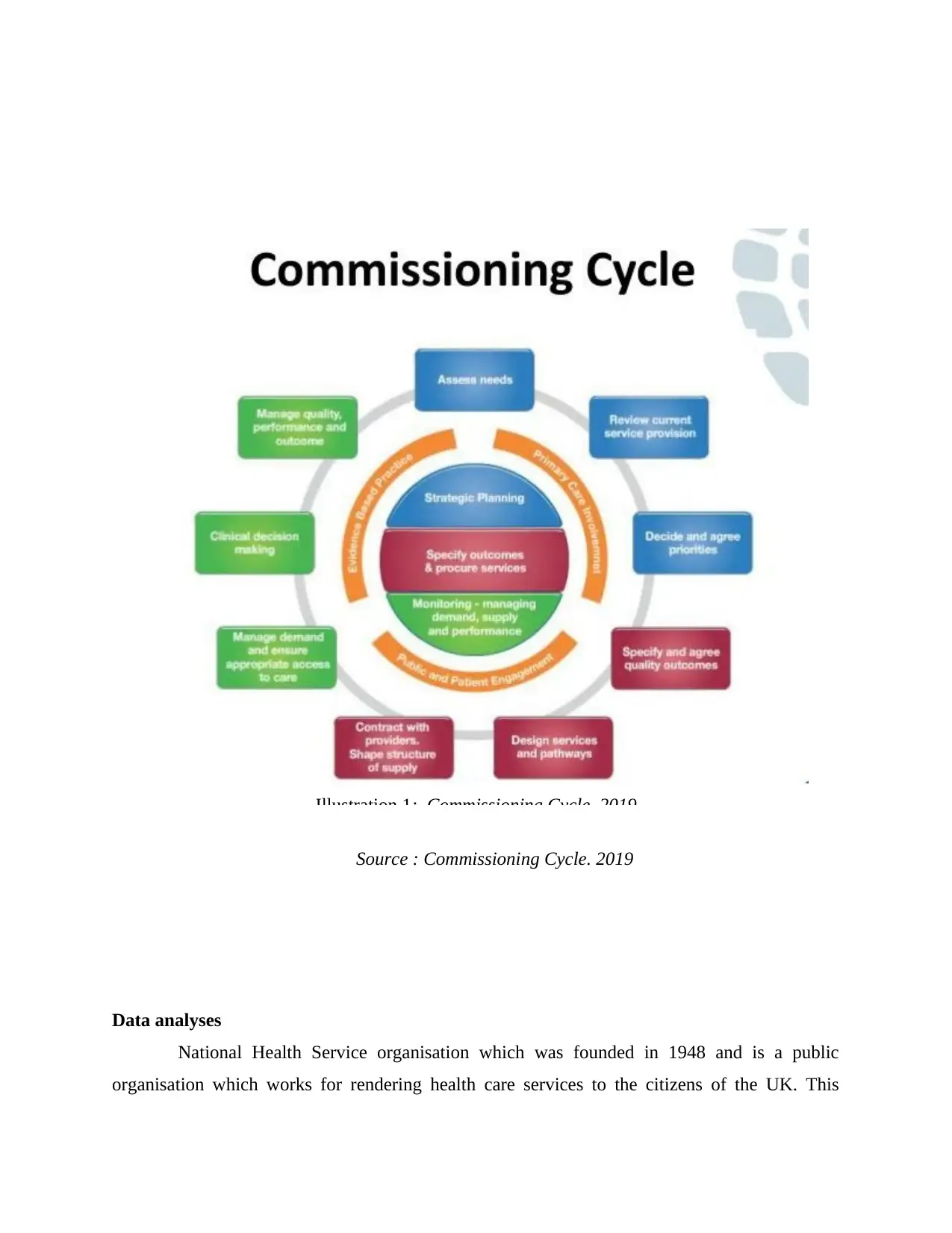
Source : Commissioning Cycle. 2019
Data analyses
National Health Service organisation which was founded in 1948 and is a public
organisation which works for rendering health care services to the citizens of the UK. This
Illustration 1: Commissioning Cycle. 2019
Data analyses
National Health Service organisation which was founded in 1948 and is a public
organisation which works for rendering health care services to the citizens of the UK. This
Illustration 1: Commissioning Cycle. 2019
⊘ This is a preview!⊘
Do you want full access?
Subscribe today to unlock all pages.

Trusted by 1+ million students worldwide
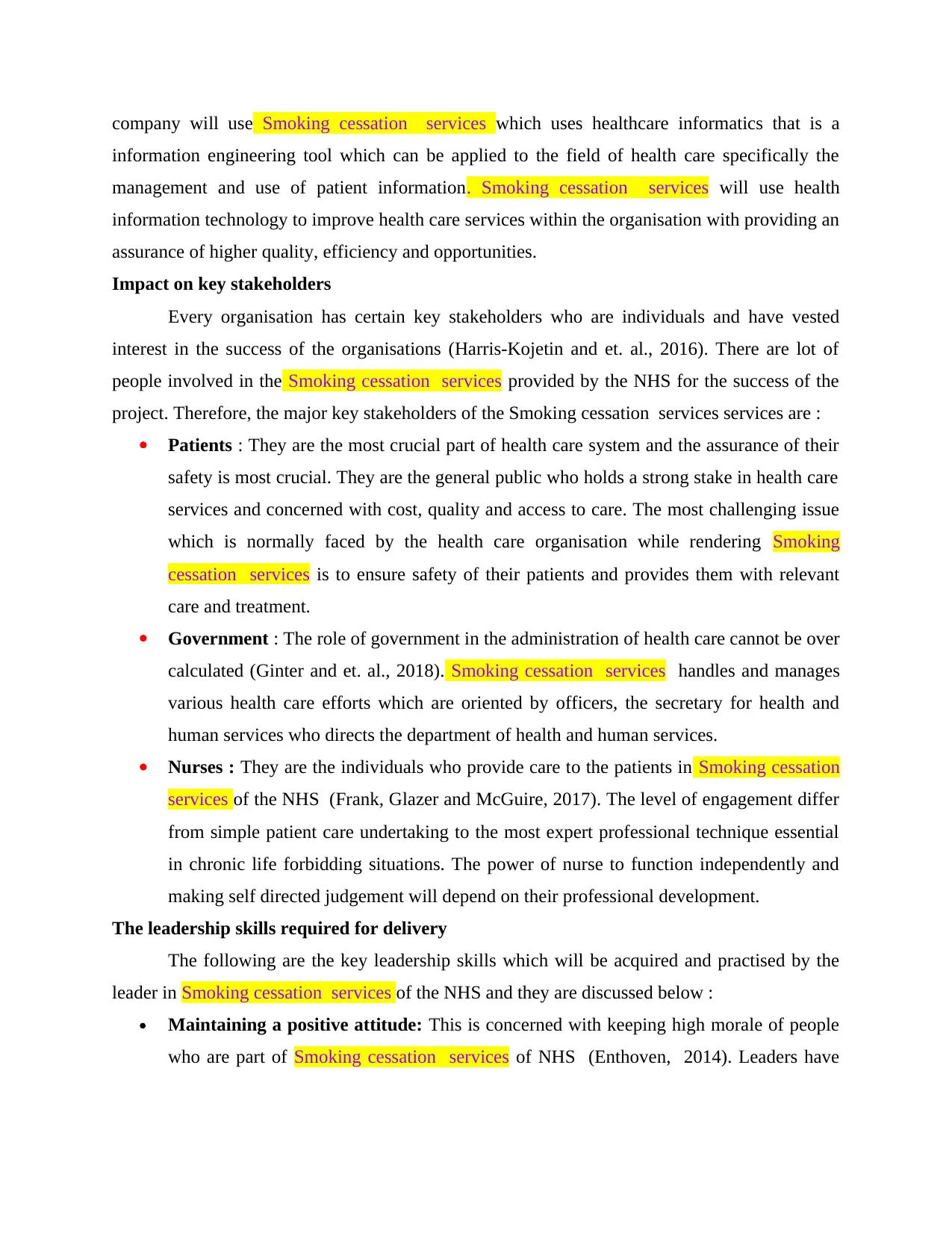
company will use Smoking cessation services which uses healthcare informatics that is a
information engineering tool which can be applied to the field of health care specifically the
management and use of patient information. Smoking cessation services will use health
information technology to improve health care services within the organisation with providing an
assurance of higher quality, efficiency and opportunities.
Impact on key stakeholders
Every organisation has certain key stakeholders who are individuals and have vested
interest in the success of the organisations (Harris-Kojetin and et. al., 2016). There are lot of
people involved in the Smoking cessation services provided by the NHS for the success of the
project. Therefore, the major key stakeholders of the Smoking cessation services services are :
Patients : They are the most crucial part of health care system and the assurance of their
safety is most crucial. They are the general public who holds a strong stake in health care
services and concerned with cost, quality and access to care. The most challenging issue
which is normally faced by the health care organisation while rendering Smoking
cessation services is to ensure safety of their patients and provides them with relevant
care and treatment.
Government : The role of government in the administration of health care cannot be over
calculated (Ginter and et. al., 2018). Smoking cessation services handles and manages
various health care efforts which are oriented by officers, the secretary for health and
human services who directs the department of health and human services.
Nurses : They are the individuals who provide care to the patients in Smoking cessation
services of the NHS (Frank, Glazer and McGuire, 2017). The level of engagement differ
from simple patient care undertaking to the most expert professional technique essential
in chronic life forbidding situations. The power of nurse to function independently and
making self directed judgement will depend on their professional development.
The leadership skills required for delivery
The following are the key leadership skills which will be acquired and practised by the
leader in Smoking cessation services of the NHS and they are discussed below :
Maintaining a positive attitude: This is concerned with keeping high morale of people
who are part of Smoking cessation services of NHS (Enthoven, 2014). Leaders have
information engineering tool which can be applied to the field of health care specifically the
management and use of patient information. Smoking cessation services will use health
information technology to improve health care services within the organisation with providing an
assurance of higher quality, efficiency and opportunities.
Impact on key stakeholders
Every organisation has certain key stakeholders who are individuals and have vested
interest in the success of the organisations (Harris-Kojetin and et. al., 2016). There are lot of
people involved in the Smoking cessation services provided by the NHS for the success of the
project. Therefore, the major key stakeholders of the Smoking cessation services services are :
Patients : They are the most crucial part of health care system and the assurance of their
safety is most crucial. They are the general public who holds a strong stake in health care
services and concerned with cost, quality and access to care. The most challenging issue
which is normally faced by the health care organisation while rendering Smoking
cessation services is to ensure safety of their patients and provides them with relevant
care and treatment.
Government : The role of government in the administration of health care cannot be over
calculated (Ginter and et. al., 2018). Smoking cessation services handles and manages
various health care efforts which are oriented by officers, the secretary for health and
human services who directs the department of health and human services.
Nurses : They are the individuals who provide care to the patients in Smoking cessation
services of the NHS (Frank, Glazer and McGuire, 2017). The level of engagement differ
from simple patient care undertaking to the most expert professional technique essential
in chronic life forbidding situations. The power of nurse to function independently and
making self directed judgement will depend on their professional development.
The leadership skills required for delivery
The following are the key leadership skills which will be acquired and practised by the
leader in Smoking cessation services of the NHS and they are discussed below :
Maintaining a positive attitude: This is concerned with keeping high morale of people
who are part of Smoking cessation services of NHS (Enthoven, 2014). Leaders have
Paraphrase This Document
Need a fresh take? Get an instant paraphrase of this document with our AI Paraphraser
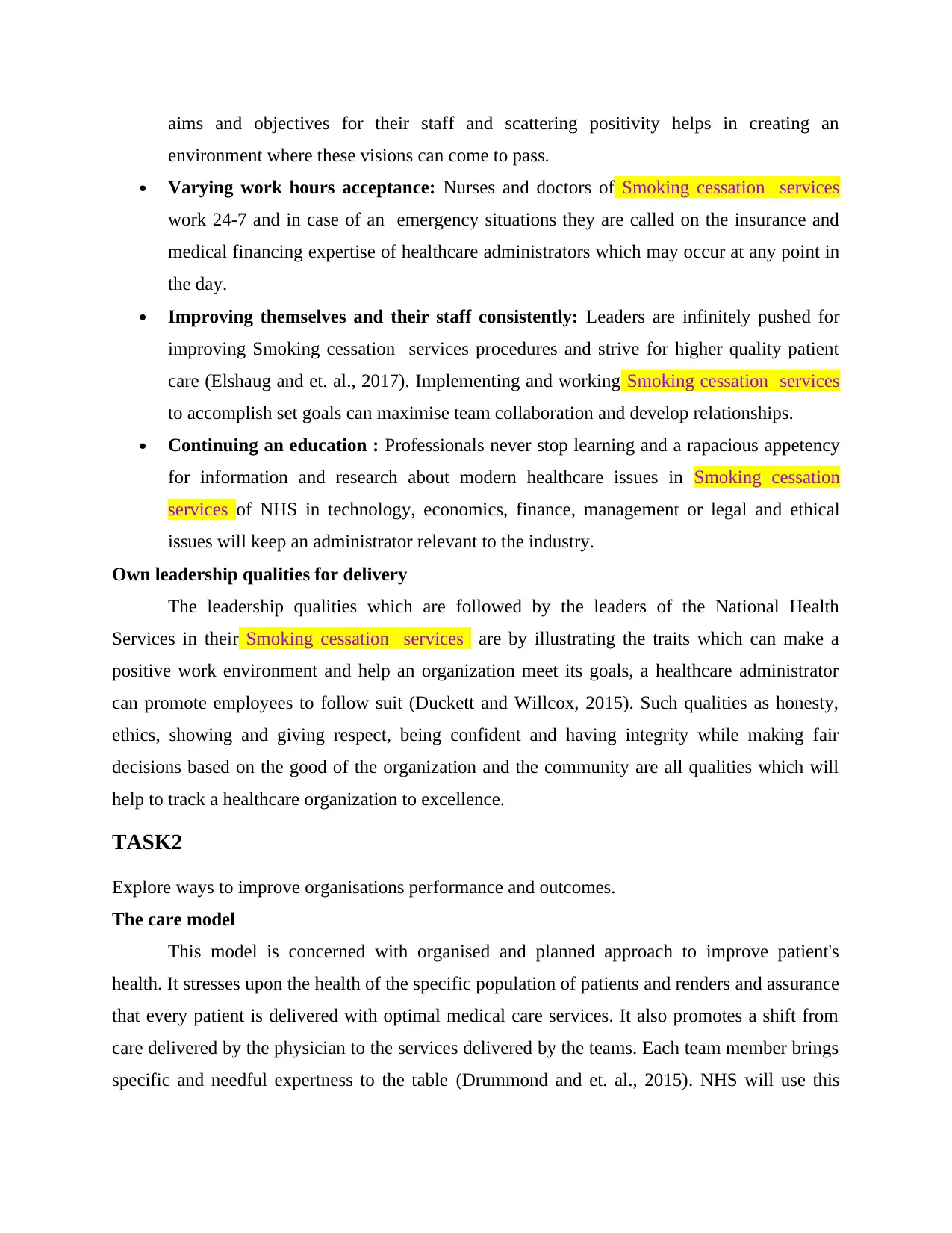
aims and objectives for their staff and scattering positivity helps in creating an
environment where these visions can come to pass.
Varying work hours acceptance: Nurses and doctors of Smoking cessation services
work 24-7 and in case of an emergency situations they are called on the insurance and
medical financing expertise of healthcare administrators which may occur at any point in
the day.
Improving themselves and their staff consistently: Leaders are infinitely pushed for
improving Smoking cessation services procedures and strive for higher quality patient
care (Elshaug and et. al., 2017). Implementing and working Smoking cessation services
to accomplish set goals can maximise team collaboration and develop relationships.
Continuing an education : Professionals never stop learning and a rapacious appetency
for information and research about modern healthcare issues in Smoking cessation
services of NHS in technology, economics, finance, management or legal and ethical
issues will keep an administrator relevant to the industry.
Own leadership qualities for delivery
The leadership qualities which are followed by the leaders of the National Health
Services in their Smoking cessation services are by illustrating the traits which can make a
positive work environment and help an organization meet its goals, a healthcare administrator
can promote employees to follow suit (Duckett and Willcox, 2015). Such qualities as honesty,
ethics, showing and giving respect, being confident and having integrity while making fair
decisions based on the good of the organization and the community are all qualities which will
help to track a healthcare organization to excellence.
TASK2
Explore ways to improve organisations performance and outcomes.
The care model
This model is concerned with organised and planned approach to improve patient's
health. It stresses upon the health of the specific population of patients and renders and assurance
that every patient is delivered with optimal medical care services. It also promotes a shift from
care delivered by the physician to the services delivered by the teams. Each team member brings
specific and needful expertness to the table (Drummond and et. al., 2015). NHS will use this
environment where these visions can come to pass.
Varying work hours acceptance: Nurses and doctors of Smoking cessation services
work 24-7 and in case of an emergency situations they are called on the insurance and
medical financing expertise of healthcare administrators which may occur at any point in
the day.
Improving themselves and their staff consistently: Leaders are infinitely pushed for
improving Smoking cessation services procedures and strive for higher quality patient
care (Elshaug and et. al., 2017). Implementing and working Smoking cessation services
to accomplish set goals can maximise team collaboration and develop relationships.
Continuing an education : Professionals never stop learning and a rapacious appetency
for information and research about modern healthcare issues in Smoking cessation
services of NHS in technology, economics, finance, management or legal and ethical
issues will keep an administrator relevant to the industry.
Own leadership qualities for delivery
The leadership qualities which are followed by the leaders of the National Health
Services in their Smoking cessation services are by illustrating the traits which can make a
positive work environment and help an organization meet its goals, a healthcare administrator
can promote employees to follow suit (Duckett and Willcox, 2015). Such qualities as honesty,
ethics, showing and giving respect, being confident and having integrity while making fair
decisions based on the good of the organization and the community are all qualities which will
help to track a healthcare organization to excellence.
TASK2
Explore ways to improve organisations performance and outcomes.
The care model
This model is concerned with organised and planned approach to improve patient's
health. It stresses upon the health of the specific population of patients and renders and assurance
that every patient is delivered with optimal medical care services. It also promotes a shift from
care delivered by the physician to the services delivered by the teams. Each team member brings
specific and needful expertness to the table (Drummond and et. al., 2015). NHS will use this
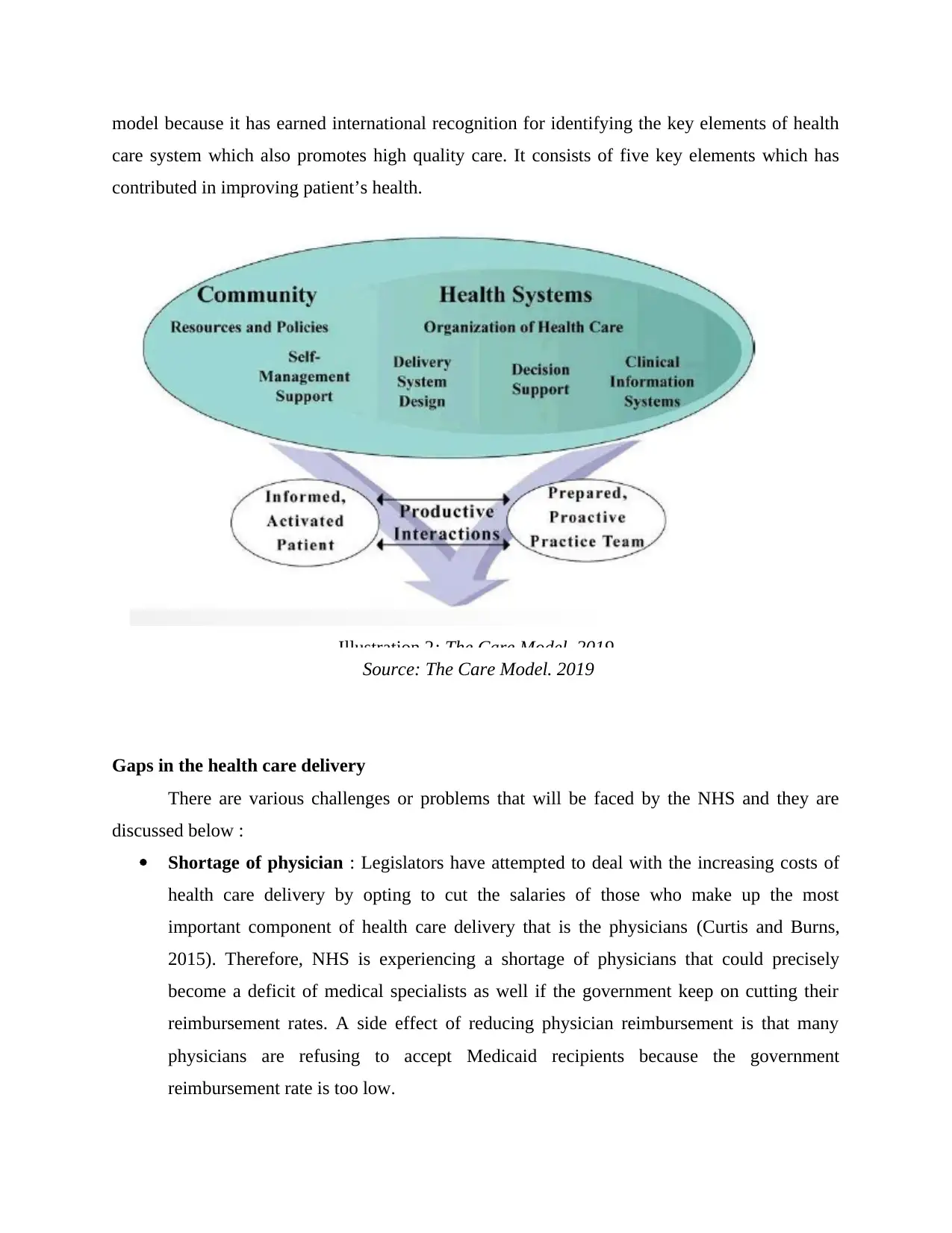
model because it has earned international recognition for identifying the key elements of health
care system which also promotes high quality care. It consists of five key elements which has
contributed in improving patient’s health.
Source: The Care Model. 2019
Gaps in the health care delivery
There are various challenges or problems that will be faced by the NHS and they are
discussed below :
Shortage of physician : Legislators have attempted to deal with the increasing costs of
health care delivery by opting to cut the salaries of those who make up the most
important component of health care delivery that is the physicians (Curtis and Burns,
2015). Therefore, NHS is experiencing a shortage of physicians that could precisely
become a deficit of medical specialists as well if the government keep on cutting their
reimbursement rates. A side effect of reducing physician reimbursement is that many
physicians are refusing to accept Medicaid recipients because the government
reimbursement rate is too low.
Illustration 2: The Care Model. 2019
care system which also promotes high quality care. It consists of five key elements which has
contributed in improving patient’s health.
Source: The Care Model. 2019
Gaps in the health care delivery
There are various challenges or problems that will be faced by the NHS and they are
discussed below :
Shortage of physician : Legislators have attempted to deal with the increasing costs of
health care delivery by opting to cut the salaries of those who make up the most
important component of health care delivery that is the physicians (Curtis and Burns,
2015). Therefore, NHS is experiencing a shortage of physicians that could precisely
become a deficit of medical specialists as well if the government keep on cutting their
reimbursement rates. A side effect of reducing physician reimbursement is that many
physicians are refusing to accept Medicaid recipients because the government
reimbursement rate is too low.
Illustration 2: The Care Model. 2019
⊘ This is a preview!⊘
Do you want full access?
Subscribe today to unlock all pages.

Trusted by 1+ million students worldwide
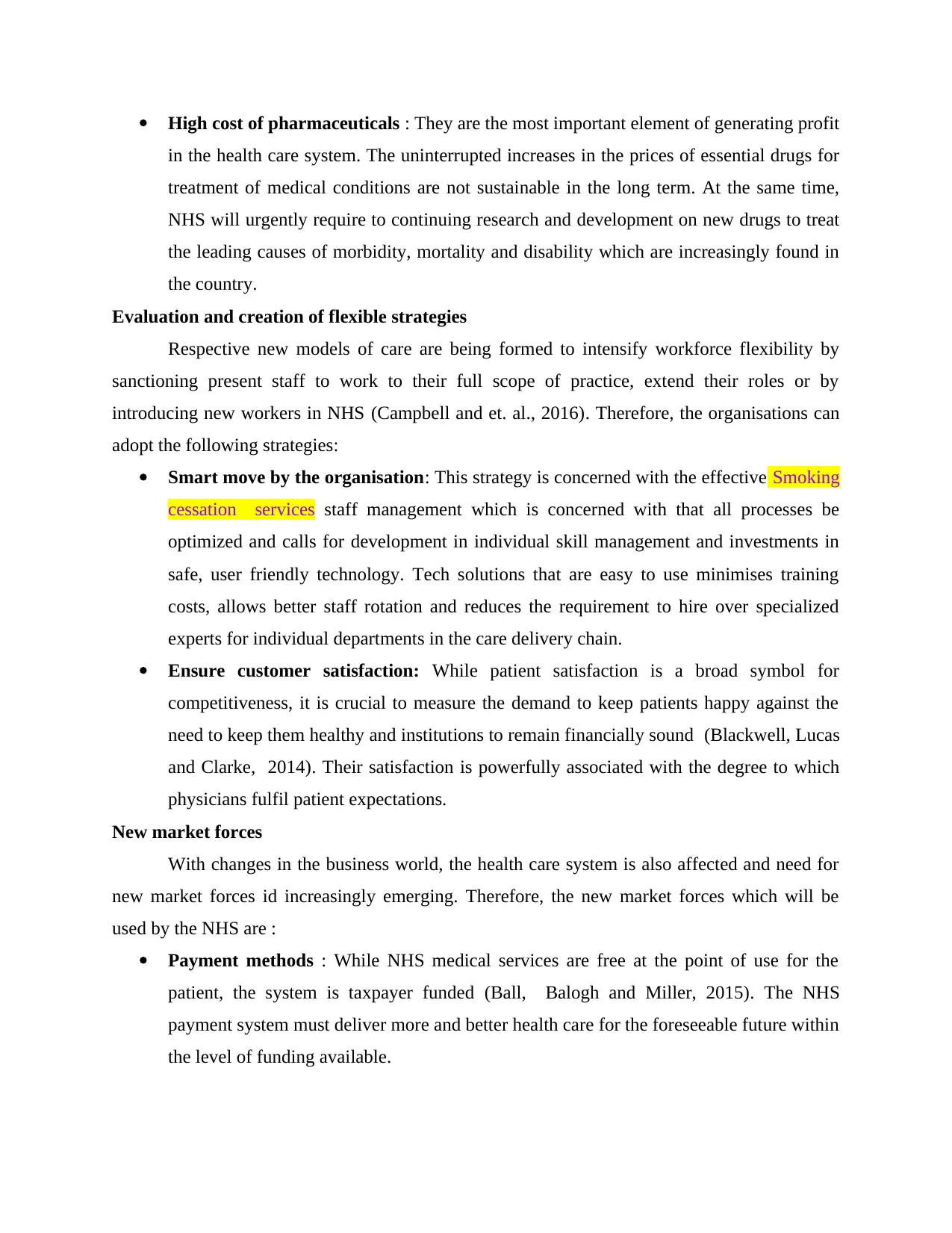
High cost of pharmaceuticals : They are the most important element of generating profit
in the health care system. The uninterrupted increases in the prices of essential drugs for
treatment of medical conditions are not sustainable in the long term. At the same time,
NHS will urgently require to continuing research and development on new drugs to treat
the leading causes of morbidity, mortality and disability which are increasingly found in
the country.
Evaluation and creation of flexible strategies
Respective new models of care are being formed to intensify workforce flexibility by
sanctioning present staff to work to their full scope of practice, extend their roles or by
introducing new workers in NHS (Campbell and et. al., 2016). Therefore, the organisations can
adopt the following strategies:
Smart move by the organisation: This strategy is concerned with the effective Smoking
cessation services staff management which is concerned with that all processes be
optimized and calls for development in individual skill management and investments in
safe, user friendly technology. Tech solutions that are easy to use minimises training
costs, allows better staff rotation and reduces the requirement to hire over specialized
experts for individual departments in the care delivery chain.
Ensure customer satisfaction: While patient satisfaction is a broad symbol for
competitiveness, it is crucial to measure the demand to keep patients happy against the
need to keep them healthy and institutions to remain financially sound (Blackwell, Lucas
and Clarke, 2014). Their satisfaction is powerfully associated with the degree to which
physicians fulfil patient expectations.
New market forces
With changes in the business world, the health care system is also affected and need for
new market forces id increasingly emerging. Therefore, the new market forces which will be
used by the NHS are :
Payment methods : While NHS medical services are free at the point of use for the
patient, the system is taxpayer funded (Ball, Balogh and Miller, 2015). The NHS
payment system must deliver more and better health care for the foreseeable future within
the level of funding available.
in the health care system. The uninterrupted increases in the prices of essential drugs for
treatment of medical conditions are not sustainable in the long term. At the same time,
NHS will urgently require to continuing research and development on new drugs to treat
the leading causes of morbidity, mortality and disability which are increasingly found in
the country.
Evaluation and creation of flexible strategies
Respective new models of care are being formed to intensify workforce flexibility by
sanctioning present staff to work to their full scope of practice, extend their roles or by
introducing new workers in NHS (Campbell and et. al., 2016). Therefore, the organisations can
adopt the following strategies:
Smart move by the organisation: This strategy is concerned with the effective Smoking
cessation services staff management which is concerned with that all processes be
optimized and calls for development in individual skill management and investments in
safe, user friendly technology. Tech solutions that are easy to use minimises training
costs, allows better staff rotation and reduces the requirement to hire over specialized
experts for individual departments in the care delivery chain.
Ensure customer satisfaction: While patient satisfaction is a broad symbol for
competitiveness, it is crucial to measure the demand to keep patients happy against the
need to keep them healthy and institutions to remain financially sound (Blackwell, Lucas
and Clarke, 2014). Their satisfaction is powerfully associated with the degree to which
physicians fulfil patient expectations.
New market forces
With changes in the business world, the health care system is also affected and need for
new market forces id increasingly emerging. Therefore, the new market forces which will be
used by the NHS are :
Payment methods : While NHS medical services are free at the point of use for the
patient, the system is taxpayer funded (Ball, Balogh and Miller, 2015). The NHS
payment system must deliver more and better health care for the foreseeable future within
the level of funding available.
Paraphrase This Document
Need a fresh take? Get an instant paraphrase of this document with our AI Paraphraser
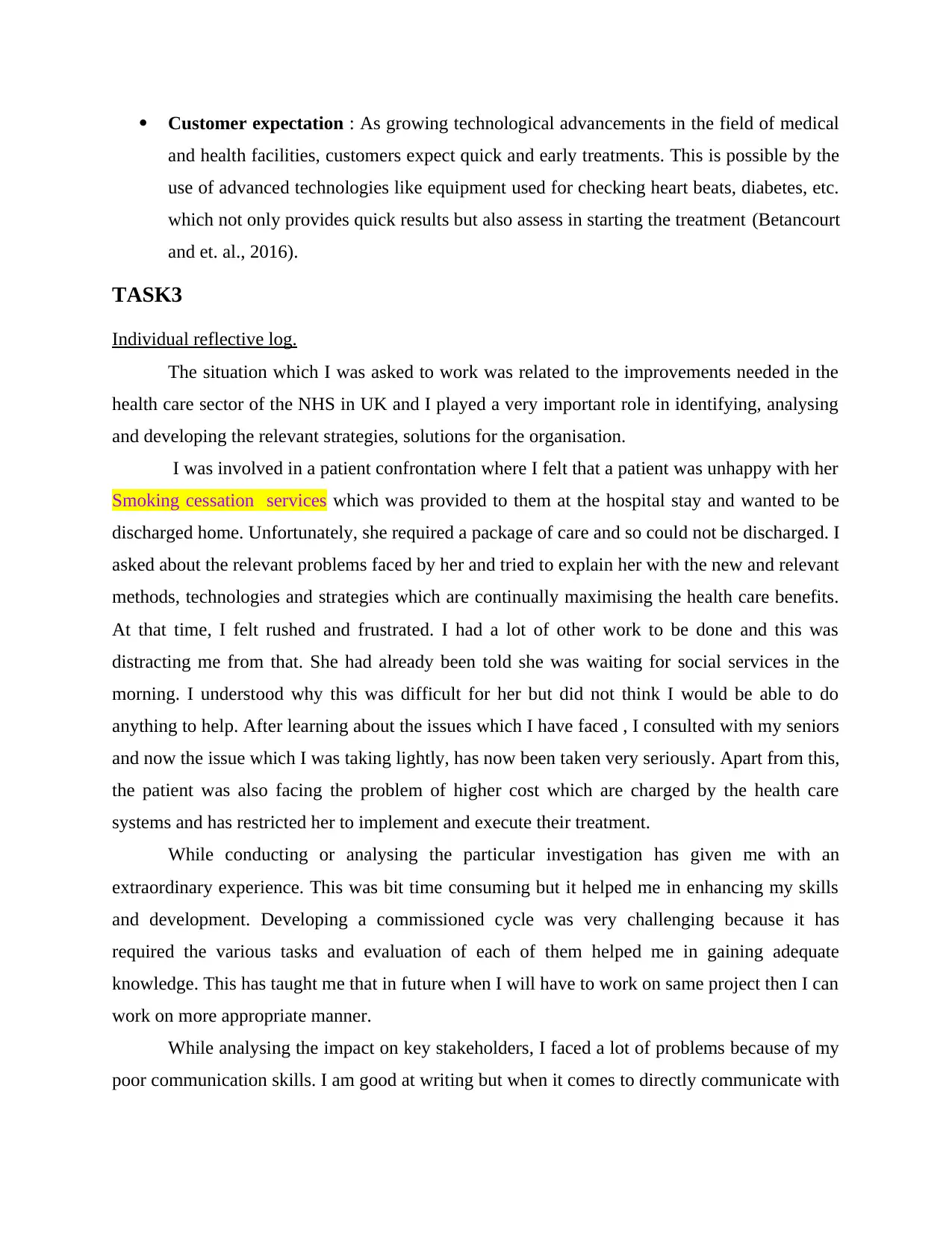
Customer expectation : As growing technological advancements in the field of medical
and health facilities, customers expect quick and early treatments. This is possible by the
use of advanced technologies like equipment used for checking heart beats, diabetes, etc.
which not only provides quick results but also assess in starting the treatment (Betancourt
and et. al., 2016).
TASK3
Individual reflective log.
The situation which I was asked to work was related to the improvements needed in the
health care sector of the NHS in UK and I played a very important role in identifying, analysing
and developing the relevant strategies, solutions for the organisation.
I was involved in a patient confrontation where I felt that a patient was unhappy with her
Smoking cessation services which was provided to them at the hospital stay and wanted to be
discharged home. Unfortunately, she required a package of care and so could not be discharged. I
asked about the relevant problems faced by her and tried to explain her with the new and relevant
methods, technologies and strategies which are continually maximising the health care benefits.
At that time, I felt rushed and frustrated. I had a lot of other work to be done and this was
distracting me from that. She had already been told she was waiting for social services in the
morning. I understood why this was difficult for her but did not think I would be able to do
anything to help. After learning about the issues which I have faced , I consulted with my seniors
and now the issue which I was taking lightly, has now been taken very seriously. Apart from this,
the patient was also facing the problem of higher cost which are charged by the health care
systems and has restricted her to implement and execute their treatment.
While conducting or analysing the particular investigation has given me with an
extraordinary experience. This was bit time consuming but it helped me in enhancing my skills
and development. Developing a commissioned cycle was very challenging because it has
required the various tasks and evaluation of each of them helped me in gaining adequate
knowledge. This has taught me that in future when I will have to work on same project then I can
work on more appropriate manner.
While analysing the impact on key stakeholders, I faced a lot of problems because of my
poor communication skills. I am good at writing but when it comes to directly communicate with
and health facilities, customers expect quick and early treatments. This is possible by the
use of advanced technologies like equipment used for checking heart beats, diabetes, etc.
which not only provides quick results but also assess in starting the treatment (Betancourt
and et. al., 2016).
TASK3
Individual reflective log.
The situation which I was asked to work was related to the improvements needed in the
health care sector of the NHS in UK and I played a very important role in identifying, analysing
and developing the relevant strategies, solutions for the organisation.
I was involved in a patient confrontation where I felt that a patient was unhappy with her
Smoking cessation services which was provided to them at the hospital stay and wanted to be
discharged home. Unfortunately, she required a package of care and so could not be discharged. I
asked about the relevant problems faced by her and tried to explain her with the new and relevant
methods, technologies and strategies which are continually maximising the health care benefits.
At that time, I felt rushed and frustrated. I had a lot of other work to be done and this was
distracting me from that. She had already been told she was waiting for social services in the
morning. I understood why this was difficult for her but did not think I would be able to do
anything to help. After learning about the issues which I have faced , I consulted with my seniors
and now the issue which I was taking lightly, has now been taken very seriously. Apart from this,
the patient was also facing the problem of higher cost which are charged by the health care
systems and has restricted her to implement and execute their treatment.
While conducting or analysing the particular investigation has given me with an
extraordinary experience. This was bit time consuming but it helped me in enhancing my skills
and development. Developing a commissioned cycle was very challenging because it has
required the various tasks and evaluation of each of them helped me in gaining adequate
knowledge. This has taught me that in future when I will have to work on same project then I can
work on more appropriate manner.
While analysing the impact on key stakeholders, I faced a lot of problems because of my
poor communication skills. I am good at writing but when it comes to directly communicate with
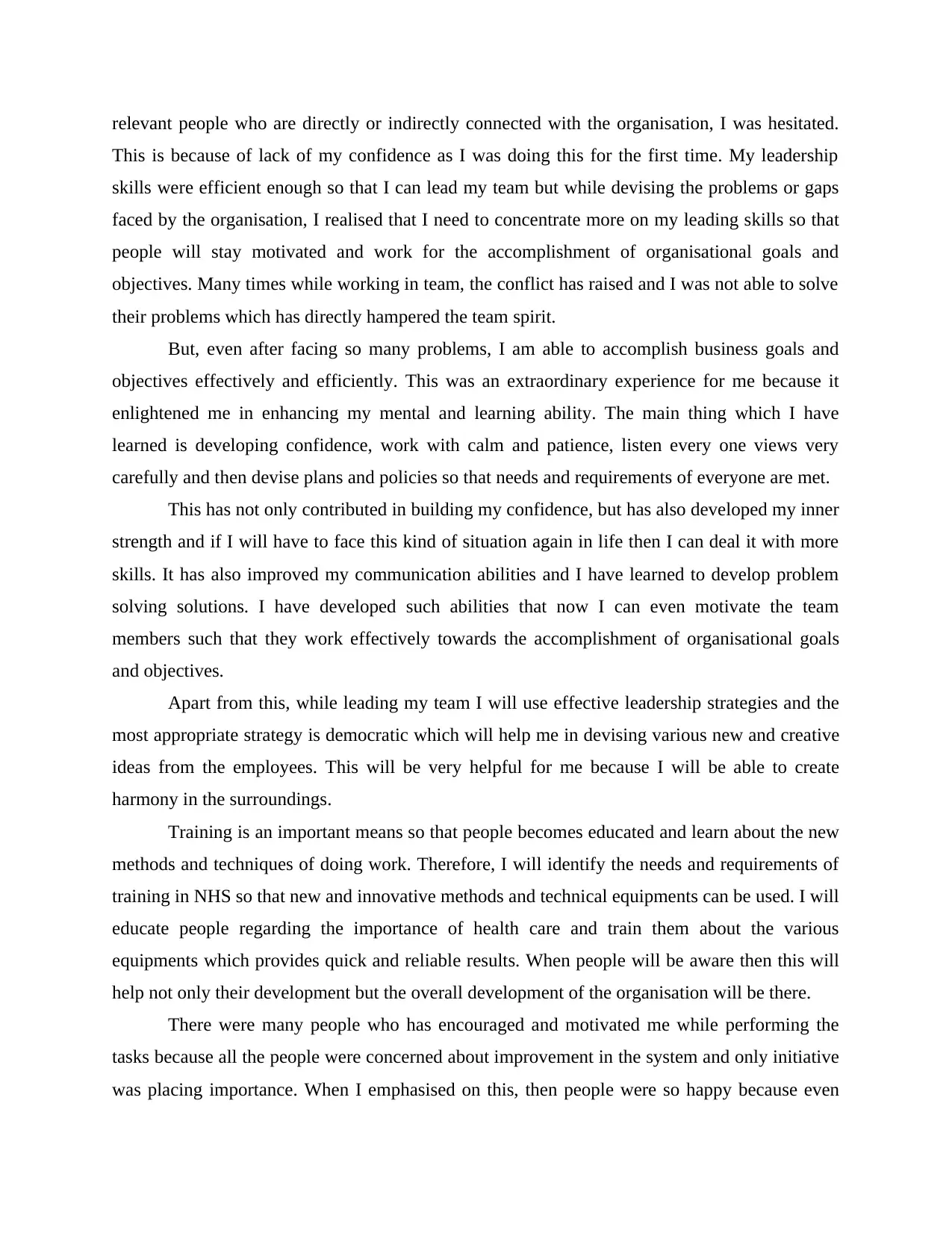
relevant people who are directly or indirectly connected with the organisation, I was hesitated.
This is because of lack of my confidence as I was doing this for the first time. My leadership
skills were efficient enough so that I can lead my team but while devising the problems or gaps
faced by the organisation, I realised that I need to concentrate more on my leading skills so that
people will stay motivated and work for the accomplishment of organisational goals and
objectives. Many times while working in team, the conflict has raised and I was not able to solve
their problems which has directly hampered the team spirit.
But, even after facing so many problems, I am able to accomplish business goals and
objectives effectively and efficiently. This was an extraordinary experience for me because it
enlightened me in enhancing my mental and learning ability. The main thing which I have
learned is developing confidence, work with calm and patience, listen every one views very
carefully and then devise plans and policies so that needs and requirements of everyone are met.
This has not only contributed in building my confidence, but has also developed my inner
strength and if I will have to face this kind of situation again in life then I can deal it with more
skills. It has also improved my communication abilities and I have learned to develop problem
solving solutions. I have developed such abilities that now I can even motivate the team
members such that they work effectively towards the accomplishment of organisational goals
and objectives.
Apart from this, while leading my team I will use effective leadership strategies and the
most appropriate strategy is democratic which will help me in devising various new and creative
ideas from the employees. This will be very helpful for me because I will be able to create
harmony in the surroundings.
Training is an important means so that people becomes educated and learn about the new
methods and techniques of doing work. Therefore, I will identify the needs and requirements of
training in NHS so that new and innovative methods and technical equipments can be used. I will
educate people regarding the importance of health care and train them about the various
equipments which provides quick and reliable results. When people will be aware then this will
help not only their development but the overall development of the organisation will be there.
There were many people who has encouraged and motivated me while performing the
tasks because all the people were concerned about improvement in the system and only initiative
was placing importance. When I emphasised on this, then people were so happy because even
This is because of lack of my confidence as I was doing this for the first time. My leadership
skills were efficient enough so that I can lead my team but while devising the problems or gaps
faced by the organisation, I realised that I need to concentrate more on my leading skills so that
people will stay motivated and work for the accomplishment of organisational goals and
objectives. Many times while working in team, the conflict has raised and I was not able to solve
their problems which has directly hampered the team spirit.
But, even after facing so many problems, I am able to accomplish business goals and
objectives effectively and efficiently. This was an extraordinary experience for me because it
enlightened me in enhancing my mental and learning ability. The main thing which I have
learned is developing confidence, work with calm and patience, listen every one views very
carefully and then devise plans and policies so that needs and requirements of everyone are met.
This has not only contributed in building my confidence, but has also developed my inner
strength and if I will have to face this kind of situation again in life then I can deal it with more
skills. It has also improved my communication abilities and I have learned to develop problem
solving solutions. I have developed such abilities that now I can even motivate the team
members such that they work effectively towards the accomplishment of organisational goals
and objectives.
Apart from this, while leading my team I will use effective leadership strategies and the
most appropriate strategy is democratic which will help me in devising various new and creative
ideas from the employees. This will be very helpful for me because I will be able to create
harmony in the surroundings.
Training is an important means so that people becomes educated and learn about the new
methods and techniques of doing work. Therefore, I will identify the needs and requirements of
training in NHS so that new and innovative methods and technical equipments can be used. I will
educate people regarding the importance of health care and train them about the various
equipments which provides quick and reliable results. When people will be aware then this will
help not only their development but the overall development of the organisation will be there.
There were many people who has encouraged and motivated me while performing the
tasks because all the people were concerned about improvement in the system and only initiative
was placing importance. When I emphasised on this, then people were so happy because even
⊘ This is a preview!⊘
Do you want full access?
Subscribe today to unlock all pages.

Trusted by 1+ million students worldwide
1 out of 20
Related Documents
Your All-in-One AI-Powered Toolkit for Academic Success.
+13062052269
info@desklib.com
Available 24*7 on WhatsApp / Email
![[object Object]](/_next/static/media/star-bottom.7253800d.svg)
Unlock your academic potential
Copyright © 2020–2026 A2Z Services. All Rights Reserved. Developed and managed by ZUCOL.





